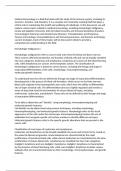Medical Immunology is a field that deals with the study of the immune system, including its
structure, function, and disorders. It is a complex and constantly evolving field that plays a
critical role in maintaining the health and wellbeing of individuals. In this document, we will
explore various topics related to medical immunology, including Hematologic Malignancy,
Innate and Adaptive Immunity, Anti-microbial Immunity and Immune Deviations (Evasion),
Immunological Tolerance and Autoimmune Diseases, Transplantation and Pregnancy,
Tumour Immunology, Immunodeficiency and Immunosenescence, and Immune technology:
vaccine strategies. Each of these topics will be discussed in detail to provide a
comprehensive understanding of the field.
Hematologic Malignancy I:
Hematologic malignancies refer to cancers that arise from the blood and bone marrow.
These cancers affect the production and function of blood cells and can be broadly classified
into two categories, leukemias and lymphomas. Leukemias are cancers of the blood-forming
cells, while lymphomas are cancers of the lymphatic system. The classification of
hematologic malignancies is based on various factors, including the lineage and stage of
maturation/differentiation of the cells, morphology, immunophenotyping, and
molecular/genetic features.
To understand how the cells are defined by lineage and stage of maturation/differentiation:
Hematopoiesis is the process of blood cell formation, which occurs in the bone marrow.
Blood cells originate from hematopoietic stem cells, which have the ability to differentiate
into all types of blood cells. The differentiation process is tightly regulated and involves a
series of steps that result in the formation of various blood cell types, including
erythrocytes, leukocytes, and platelets. These cells can be defined by their lineage and stage
of maturation/differentiation.
To be able to determine cell “identity” using morphology, immunophenotyping and
molecular/genetic features:
Cell identity can be determined using various techniques, including morphology,
immunophenotyping, and molecular/genetic features. Morphology refers to the visual
appearance of the cells under the microscope. Immunophenotyping involves the use of
antibodies that recognize specific cell surface markers to identify different cell types.
Molecular/genetic features refer to the specific genetic alterations that are present in the
cancer cells.
Classification of main types of Leukemias and Lymphomas:
Leukemias and lymphomas can be broadly classified into acute and chronic forms, based on
the speed of disease progression. Acute leukemias are characterized by the rapid
proliferation of immature blood cells, while chronic leukemias are characterized by the slow
proliferation of mature blood cells. Lymphomas are classified into two main categories,
Hodgkin's lymphoma and non-Hodgkin's lymphoma. Hodgkin's lymphoma is characterized
by the presence of Reed-Sternberg cells, while non-Hodgkin's lymphoma includes various
subtypes that are characterized based on their morphology, immunophenotype, and genetic
features.




